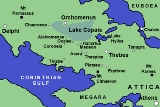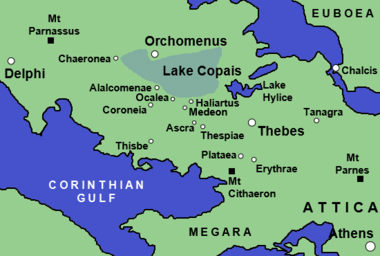
Alalcomenae
Encyclopedia
Alalcomenae, Boeotia

Boeotia
Boeotia, also spelled Beotia and Bœotia , is one of the regional units of Greece. It is part of the region of Central Greece. It was also a region of ancient Greece. Its capital is Livadeia, the second largest city being Thebes.-Geography:...
was on the south-west bank of Lake Copais
Lake Copais
Lake Copais, Kopais, or Kopaida used to be in the centre of Boeotia, Greece, west of Thebes until the late 19th century. The area where it was located, though now a plain, is still known as Kopaida.- Drainage :...
, west of Haliartus (modern Aliartos
Aliartos
Aliartos is a municipality in the Boeotia regional unit, Greece, at 109 kilometres from Athens. Population 6,351 . It is the center of the Kopais valley...
), before the lake was drained. Stephanus of Byzantium
Stephanus of Byzantium
Stephen of Byzantium, also known as Stephanus Byzantinus , was the author of an important geographical dictionary entitled Ethnica...
refers to the town by the name Alalkomenion.
In antiquity Alalcomenae was famous for a temple to the goddess Athena
Athena
In Greek mythology, Athena, Athenê, or Athene , also referred to as Pallas Athena/Athene , is the goddess of wisdom, courage, inspiration, civilization, warfare, strength, strategy, the arts, crafts, justice, and skill. Minerva, Athena's Roman incarnation, embodies similar attributes. Athena is...
Alalcomeneis
Alalcomeneis
Alalcomeneis was an epithet of the Greek goddess Athena, the origin of which was subject to several theories. Some derived it from the name of the hero Alalcomenes, or from the Boeotian village of Alalcomenae, where in some traditions she was said to have been born...
. The epic poet
Epic poetry
An epic is a lengthy narrative poem, ordinarily concerning a serious subject containing details of heroic deeds and events significant to a culture or nation. Oral poetry may qualify as an epic, and Albert Lord and Milman Parry have argued that classical epics were fundamentally an oral poetic form...
Homer
Homer
In the Western classical tradition Homer , is the author of the Iliad and the Odyssey, and is revered as the greatest ancient Greek epic poet. These epics lie at the beginning of the Western canon of literature, and have had an enormous influence on the history of literature.When he lived is...
twice refers to her as Alalkomenean Athene . The town was by a hill which Strabo
Strabo
Strabo, also written Strabon was a Greek historian, geographer and philosopher.-Life:Strabo was born to an affluent family from Amaseia in Pontus , a city which he said was situated the approximate equivalent of 75 km from the Black Sea...
calls Mount Tilphossius (named for Telphousa, the spring visited by the god Apollo
Apollo
Apollo is one of the most important and complex of the Olympian deities in Greek and Roman mythology...
). Strabo also records that the tomb of the seer Teiresias, and the temple of Tilphossian Apollo, were located just outside Alalcomenae.
Ancient sources preserve three accounts of the origin of the town's name:
- Stephanus of Byzantium and the geographer PausaniasPausanias (geographer)Pausanias was a Greek traveler and geographer of the 2nd century AD, who lived in the times of Hadrian, Antoninus Pius and Marcus Aurelius. He is famous for his Description of Greece , a lengthy work that describes ancient Greece from firsthand observations, and is a crucial link between classical...
— and probably HomerHomerIn the Western classical tradition Homer , is the author of the Iliad and the Odyssey, and is revered as the greatest ancient Greek epic poet. These epics lie at the beginning of the Western canon of literature, and have had an enormous influence on the history of literature.When he lived is...
— preserve the story that it was named after AlalcomenesAlalcomenesAlalcomenes was in Greek mythology a Boeotian autochthon, who was believed to have given the name to the Boeotian town of Alalcomenae. He was also said to have brought up Athena , who was in some traditions said to have been born in that town, and to have been the first who introduced her worship...
(or Alalkomenes, in StephanusStephanus of ByzantiumStephen of Byzantium, also known as Stephanus Byzantinus , was the author of an important geographical dictionary entitled Ethnica...
), who raised the goddess AthenaAthenaIn Greek mythology, Athena, Athenê, or Athene , also referred to as Pallas Athena/Athene , is the goddess of wisdom, courage, inspiration, civilization, warfare, strength, strategy, the arts, crafts, justice, and skill. Minerva, Athena's Roman incarnation, embodies similar attributes. Athena is...
there. - Pausanias also records an account that it was named after AlalcomeniaAlalcomeniaAlalcomenia was, in Greek mythology, one of the daughters of Ogyges. She and her two sisters, Thelxionoea and Aulis, were regarded as supernatural beings who watched over oaths and saw that they were not taken rashly or thoughtlessly...
, daughter of Ogygus, King of the EctenesEctenesThe Ectenes or Hectenes were, in Greek mythology, the autochthones or earliest inhabitants of Boeotia, where the city of Thebes would later be founded....
, the people to first occupy the land of ThebesThebes, GreeceThebes is a city in Greece, situated to the north of the Cithaeron range, which divides Boeotia from Attica, and on the southern edge of the Boeotian plain. It played an important role in Greek myth, as the site of the stories of Cadmus, Oedipus, Dionysus and others...
. - According to Stephanus of Byzantium, the Alexandrian scholar Aristarchus of SamothraceAristarchus of SamothraceAristarchus of Samothrace was a grammarian noted as the most influential of all scholars of Homeric poetry. He was the librarian of the library of Alexandria and seems to have succeeded his teacher Aristophanes of Byzantium in that role.He established the most historically important critical...
believed the town was named from the Greek verb "to protect" (< ), to reflect Athena's role as defender of the town. The early "D" scholia on the IliadIliadThe Iliad is an epic poem in dactylic hexameters, traditionally attributed to Homer. Set during the Trojan War, the ten-year siege of the city of Troy by a coalition of Greek states, it tells of the battles and events during the weeks of a quarrel between King Agamemnon and the warrior Achilles...
also reflect this account, so the idea may pre-date Aristarchus.
In view of the cult of Athena there, presumably local myth in Alalcomenae followed the first of these theories. Pausanias recalls a story that the Roman
Ancient Rome
Ancient Rome was a thriving civilization that grew on the Italian Peninsula as early as the 8th century BC. Located along the Mediterranean Sea and centered on the city of Rome, it expanded to one of the largest empires in the ancient world....
general Sulla
Lucius Cornelius Sulla
Lucius Cornelius Sulla Felix , known commonly as Sulla, was a Roman general and statesman. He had the rare distinction of holding the office of consul twice, as well as that of dictator...
stole the icon of Athena from the temple, and in revenge Athena sent a plague of lice upon him; but afterwards the temple was neglected.
Alalcomenae, Ithaca or Asteris
The ancient geographer StraboStrabo
Strabo, also written Strabon was a Greek historian, geographer and philosopher.-Life:Strabo was born to an affluent family from Amaseia in Pontus , a city which he said was situated the approximate equivalent of 75 km from the Black Sea...
refers to an Alalcomenae on the tiny island of Asteria, between Ithaca
Ithaca
Ithaca or Ithaka is an island located in the Ionian Sea, in Greece, with an area of and a little more than three thousand inhabitants. It is also a separate regional unit of the Ionian Islands region, and the only municipality of the regional unit. It lies off the northeast coast of Kefalonia and...
and Kefalonia
Kefalonia
The island of Cephalonia, also known as Kefalonia, Cephallenia, Cephallonia, Kefallinia, or Kefallonia , is the largest of the Ionian Islands in western Greece, with an area of . It is also a separate regional unit of the Ionian Islands region, and the only municipality of the regional unit...
(Homer calls the island Asteris).
Plutarch
Plutarch
Plutarch then named, on his becoming a Roman citizen, Lucius Mestrius Plutarchus , c. 46 – 120 AD, was a Greek historian, biographer, essayist, and Middle Platonist known primarily for his Parallel Lives and Moralia...
, however, refers to Alalcomenae as a "city of the Ithacans". This could mean that he imagined it as being on Ithaca, or merely that it belonged to Ithaca. Strabo's discussion makes it clear that it was an extremely minor village; nonetheless, because of Plutarch's reference one archaeological site on Ithaca now bears the name Alalkomenes.
Alalcomenae, Thessaly
StraboStrabo
Strabo, also written Strabon was a Greek historian, geographer and philosopher.-Life:Strabo was born to an affluent family from Amaseia in Pontus , a city which he said was situated the approximate equivalent of 75 km from the Black Sea...
refers to another Alalcomenae in his description of Thesprotia. The town still exists, now called Alalkomenes, in the Kalampaka
Kalampaka
Kalabaka is a municipality in the Trikala peripheral unit, part of Thessaly in Greece. The population 11,841 . The Meteora monasteries are located in the town. Kalabaka is the northwestern terminal of the old Thessaly Railways, now part of OSE...
area of Thessaly
Thessaly
Thessaly is a traditional geographical region and an administrative region of Greece, comprising most of the ancient region of the same name. Before the Greek Dark Ages, Thessaly was known as Aeolia, and appears thus in Homer's Odyssey....
.
External links
- Pausanias on Boeotian Alalcomenae (tr. W.H.S. Jones and H.A. Ormerod, 1918)
- Strabo on Boeotian Alalcomenae (tr. H.L. Jones, 1924)
- Strabo on Asterian Alalcomenae (tr. H.L. Jones, 1924)
- Strabo on Thessalian Alalcomenae (tr. H.L. Jones, 1924)

